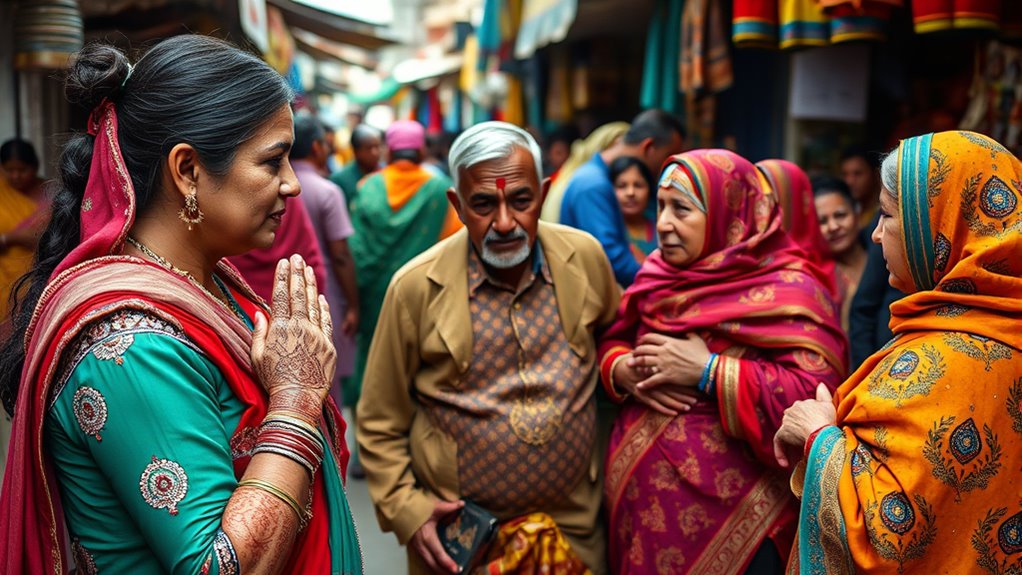Cultural norms heavily influence how different societies view and regulate adultery. In Western countries, individual choice and personal rights mean adultery isn’t usually criminal, but it can damage reputations. In contrast, many Middle Eastern and South Asian societies see adultery as a serious moral and legal breach, with strict punishments and emphasis on honor. Indigenous communities may have flexible or strict views depending on traditions. Keep exploring to see how these boundaries shape social expectations worldwide.
Key Takeaways
- Cultural norms define what behaviors are considered acceptable or unacceptable regarding fidelity, shaping societal boundaries on adultery.
- Legal and religious frameworks in various regions enforce differing punishments and restrictions based on local norms.
- Perceptions of betrayal and social repercussions of adultery vary widely, influenced by cultural values and community cohesion.
- Some societies tolerate or even accept extramarital relationships, while others strictly prohibit and penalize them.
- Understanding cultural context is essential to grasp how norms influence the social and legal boundaries surrounding adultery.

Have you ever wondered how different cultures view adultery? It’s fascinating to see how societal norms, religious beliefs, and historical contexts shape what’s considered acceptable or unacceptable when it comes to relationships. In some societies, adultery is seen as a serious breach of trust that can lead to severe consequences, while in others, it may be tolerated or even overlooked, depending on the circumstances. These varying perceptions influence not only individual behavior but also legal systems and social expectations.
For instance, in many Western countries, adultery is often regarded as a personal matter, and although it may cause emotional pain or lead to divorce, it rarely results in criminal punishment. The focus tends to be on individual rights and freedom, emphasizing personal choice over strict adherence to social or religious codes. However, even in these cultures, adultery can carry social stigma, affecting reputation and relationships, especially among close-knit communities or religious groups. The boundaries are fluid, and the social consequences can be just as impactful as legal ones.
In contrast, some Middle Eastern and South Asian societies maintain strict views rooted in religious doctrines, particularly Islam, Hinduism, or traditional interpretations of Christianity. Here, adultery can be considered a serious offense not only morally but also legally. Punishments, historically or presently, might include public shaming, fines, or even corporal punishment. The emphasis on honor and family reputation makes adultery a threat to social cohesion, and communities often uphold these norms fiercely. In these contexts, the boundaries are well-defined, and crossing them can lead to social ostracism or legal repercussions, reinforcing the importance of fidelity and societal expectations.
In many indigenous cultures, views on adultery can vary widely, often intertwined with long-standing traditions and social roles. Some communities might tolerate certain forms of extramarital relationships if they serve specific social or ceremonial purposes, while others strictly enforce fidelity to maintain harmony within the tribe or clan. The boundaries are shaped by communal consensus and cultural values, which can differ considerably from Western or Middle Eastern standards. In these societies, personal choice is balanced against collective well-being, making the definition of adultery more flexible or more rigid, depending on the context.
Additionally, understanding how cultural norms influence perceptions of fidelity helps explain why what is deemed acceptable in one society might be unacceptable in another. These diverse perspectives highlight how deeply cultural norms influence perceptions of fidelity and trust. What’s considered a grave violation in one society might be overlooked or rationalized in another. Recognizing these differences helps us understand that the boundaries around adultery are not universal but are molded by the social, religious, and historical fabric of each community.
Frequently Asked Questions
How Do Legal Penalties for Adultery Vary Worldwide?
Legal penalties for adultery vary widely around the world. In some countries, you could face severe punishments like fines, imprisonment, or even corporal punishment. In others, adultery might be legal or carry no criminal consequences at all. You should be aware that cultural and legal norms heavily influence these laws, so what’s punishable in one place might be entirely acceptable or ignored elsewhere. Always check local laws if you’re unsure.
Are There Cultures Where Adultery Is Completely Accepted?
You might think adultery is universally condemned, but in some cultures, it’s surprisingly accepted or even tolerated. For example, certain indigenous communities or historical societies have viewed it more leniently, emphasizing communal relationships over strict monogamy. While modern Western norms tend to stigmatize it, these cultural differences show that what’s considered taboo can vary widely, reflecting deeper values around marriage, fidelity, and social harmony.
How Do Religious Beliefs Influence Adultery Norms?
Religious beliefs greatly influence adultery norms by establishing clear moral guidelines. If you’re part of a faith that condemns adultery, you’ll likely face strong social and spiritual repercussions for engaging in it. Conversely, in religions with more permissive views, you might see less stigma attached. Your adherence to or deviation from these beliefs shapes how adultery is perceived and tolerated within your community, affecting personal choices and societal expectations.
What Impact Does Globalization Have on Traditional Views of Adultery?
Globalization influences traditional views of adultery by exposing you to diverse cultural norms and increasing awareness of different perspectives. It often challenges longstanding beliefs, prompting you to reconsider what’s acceptable or taboo. As you access global media and connect with people worldwide, your understanding of relationships evolves, leading to more liberal attitudes in some cases, while reinforcing traditional values in others. This interconnectedness ultimately reshapes personal and societal views on adultery.
How Does Gender Influence Perceptions of Adultery in Different Societies?
You see that gender heavily influences how societies view adultery. In many cultures, men might face less blame or even be excused for infidelity, while women could face severe social sanctions or dishonor. These perceptions stem from deeply rooted gender roles and expectations. Your understanding of these differences highlights how societal norms assign varying moral and social boundaries based on gender, shaping behaviors and judgments around adultery across cultures.
Conclusion
As you navigate these cultural waters, remember that adultery is like a delicate thread woven into society’s fabric. Its strength and color depend on the norms and symbols each culture holds dear. Respecting these boundaries is like tending a fragile garden—carefully nurturing trust and understanding. By recognizing the symbolic meanings behind these customs, you can build bridges instead of barriers, fostering harmony where diverse views on love and fidelity flourish like a resilient, vibrant tapestry.









